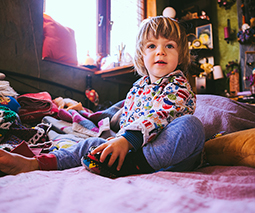What to do when your toddler’s favourite word is “No!”

You: “Would you like to see Grandma?”
Your toddler: “No!”
You: “Do you like Grandma?”
Your toddler: “No!”
You: “Why don’t you like Grandma?”
Your toddler: “No!”
When the ‘no stage’ is upon you, it can feel like your little one’s vocabulary consists of only one word. With those two little letters, she kills any hope you have of having a proper conversation. What’s more, she tends to say her favourite word in such a forthright way, it makes you nervous for the teenage years.
But here’s the thing: she’s a toddler. And toddlers assert their budding independence in lots of ways. From the tantrum over being strapped into the car seat, to throwing her sippy cup on the floor because she wanted the red one, the ‘no’ stage, it’s all just another part of this autonomy seeking.
Still, if her negativity is getting a bit much, here’s how to teach her some positive language.
1. Rethink your own language
Don’t you hate it when articles like this hold up a mirror and ask you to look at how you might be influencing your child’s behaviour?! But when it comes to speech and language development, toddlers really are learning through repetition and the interaction they have with the adults in their life, so please bear with me.
Without thinking about it, you may actually be saying ‘no’ a lot these days and using more negative language yourself. “Don’t touch that.” “Stop that.” “I said no!” are just some of the things we often say when parenting little ones. It’s understandable. I do it with my own. So if you are sick of hearing the n-word come out of your own mouth, you can try rephrasing things in a positive way, so your toddler also hears it less.
Instead of saying “No more screaming” you could say “Please use your quiet voice”, or “Don’t climb the chair” could be rephrased to “Off the couch please. Put your feet on the ground.”

2. State instead of ask
If ‘no’ is your toddler’s default answer to everything, try using statements instead of asking questions. For example, rather than asking, “Would you like a bath?” you could simply say, “It’s time for a bath!” and not give her the option of telling you she doesn’t want one.
3. Give her choices
If given a choice, your toddler will feel like she has some control and this may alleviate her desire to be so assertive. You could try giving her two choices so as not to overwhelm her. For example, “Would you like a banana or an apple?”
4. Let her have a go
Your tot will often scream “Nooooo!” because she’s frustrated at having little or no autonomy. Try giving her some control and you may find she doesn’t feel the need to say it so much. This could be letting her wear her princess outfit instead of the sensible shorts and t-shirt you’d picked out for her to wear to the shops, or letting her climb into her car seat instead of being forcibly plonked in it and strapped in.
Just a phase
If all else fails, try to remember the ‘no’ stage is something she’ll grow out of so it won’t last forever. Just like the ‘needing to be rocked off to sleep phase,’ this too shall pass. Hang in there!
 Need some more speech and language development advice? Our Parent School experts can help. Click to find out more or book a one-on-one screening call with a speech pathologist.
Need some more speech and language development advice? Our Parent School experts can help. Click to find out more or book a one-on-one screening call with a speech pathologist.









